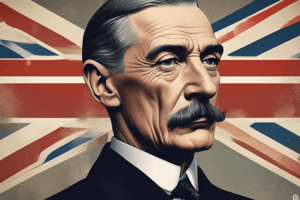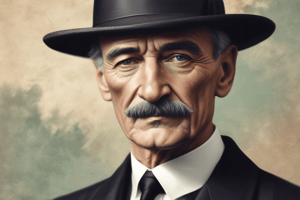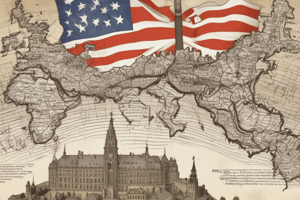Podcast
Questions and Answers
What was the primary reason for Stanley Baldwin's resignation as prime minister in 1937?
What was the primary reason for Stanley Baldwin's resignation as prime minister in 1937?
Ill health
What was the economic climate like during Chamberlain's premiership?
What was the economic climate like during Chamberlain's premiership?
Economic recovery, falling unemployment, and stable prices
What was the main challenge faced by the National Government under Chamberlain and Baldwin?
What was the main challenge faced by the National Government under Chamberlain and Baldwin?
The breakdown of international order, making war increasingly likely
What drove the National Government to make concessions to Nazi Germany?
What drove the National Government to make concessions to Nazi Germany?
What event marked the end of the 'Phoney War' in April 1940?
What event marked the end of the 'Phoney War' in April 1940?
What was the central theme of Churchill's first speech as prime minister to the House of Commons on 13 May 1940?
What was the central theme of Churchill's first speech as prime minister to the House of Commons on 13 May 1940?
What was the outcome of the Norway debate in Parliament on 7 May 1940?
What was the outcome of the Norway debate in Parliament on 7 May 1940?
Why did Lord Halifax step aside to allow Churchill to become prime minister?
Why did Lord Halifax step aside to allow Churchill to become prime minister?
What was the outcome of the German Army's sweep through France in May 1940?
What was the outcome of the German Army's sweep through France in May 1940?
What was the proposal made by Halifax on 25 May 1940?
What was the proposal made by Halifax on 25 May 1940?
What was the composition of Churchill's wartime cabinet?
What was the composition of Churchill's wartime cabinet?
What was the significance of Churchill's meeting with the whole cabinet on 25 May 1940?
What was the significance of Churchill's meeting with the whole cabinet on 25 May 1940?
What was the role of the Ministry of Aircraft Production during World War II?
What was the role of the Ministry of Aircraft Production during World War II?
What was the impact of World War II on British society?
What was the impact of World War II on British society?
What was the fate of the managed economy after World War II?
What was the fate of the managed economy after World War II?
How did the wartime economy differ from the peacetime economy in Britain?
How did the wartime economy differ from the peacetime economy in Britain?
Study Notes
Chamberlain's Premiership (1937-1940)
- Neville Chamberlain became prime minister in 1937 after Stanley Baldwin's resignation due to ill health.
- Chamberlain's premiership was marked by economic recovery, falling unemployment, and stable prices.
- The National Government faced a significant challenge due to the breakdown of international order, making war increasingly likely, but the anti-war movement in Britain made rearmament difficult.
Concessions to Nazi Germany
- The National Government made concessions to Nazi Germany, partly due to the desire for peace among the electorate.
- Hitler continued to violate the Treaty of Versailles.
The 'Phoney War' and Norway Debate
- The British Expeditionary Force was mobilized to France in September 1939, followed by a seven-month stand-off with little action.
- The 'Phoney War' ended in April 1940 with a failed British attempt to save Norway from German invasion.
- The Norway debate in Parliament on May 7 led to a vote of no confidence, which Chamberlain narrowly won but recognized as a defeat in real terms.
Resignation and Churchill's Premiership
- Chamberlain attempted to form a new coalition government but was refused by the Labour Party, leading to Winston Churchill's appointment as prime minister.
- Churchill's wartime cabinet consisted of a mix of Conservative, Labour, and Liberal politicians.
- Churchill included Labour politicians who prioritized national interest over party politics.
Churchill's Premiership (1940-1945)
- Churchill delivered his first speech as prime minister on May 13, offering 'blood, toil, tears and sweat' as the situation deteriorated in France.
- The German Army's sweep through France led to a political crisis, with some ministers considering a negotiated settlement with Germany.
- Churchill argued that Britain would become a 'slave state' if it agreed to German terms, solidifying his reputation for stoicism in the face of adversity.
Wartime Economy and Government
- The government took control of war production and developed specific ministries for controlling the wartime economy.
- The managed economy was maintained by the post-war Labour government, with production levels determined by the government rather than market forces.
Studying That Suits You
Use AI to generate personalized quizzes and flashcards to suit your learning preferences.
Description
Learn about Neville Chamberlain's time as prime minister, his achievements, and the challenges he faced during a period of economic recovery and growing international tensions.




